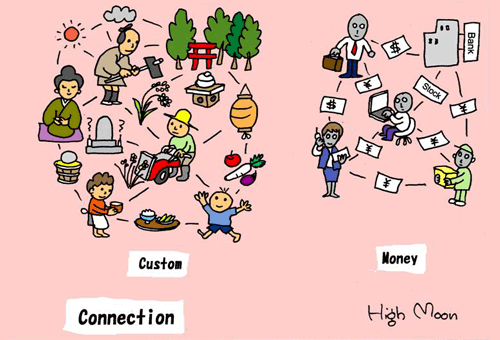"Community Wisdom Bank" is a community site to share the "wisdom" with people
around the world and to create a sustainable world!!
- 8-point Traditional Japanese Wisdom
-
- Mind over attachment to things
- Harmony with Nature
- Learning to be Content
- Idea of Circulation
- Maintaining Harmony
- Freedom of Mind
- Living based on Respect for Ancestors and Predecessors
- Caring for and Nurturing the Future Generations
Living based on Respect for Ancestors and Predecessors


- illustration : copyright (c) Hiroshi takatsuki
Respect for forefathers is deeply ingrained in the Japanese mind. Even today, many Japanese observe the long-held custom of returning to their hometown during the New Year and bon summer holidays and visiting the grave of their ancestors. The oral tradition of handing down the traditional shrine carpentry skills, for instance, is another example of how people continue to revere the wisdom of their forebears. Our view of life and wisdom as treasured gifts from our ancestors to be passed on to the future generations should assist us in our endeavor to enhance the sustainability of people and society.
Traditional wisdom lives on
Shizuoka, a “compact city” developed on urban infrastructure built by forerunners
Surrounded by Suruga Bay to the south, Akaishi Mountain Range to the north, Udo Mountain to the east and Abe River to the West, geographical expansion had never been a viable alternative for Shizuoka, a city that lies to the southwest of Tokyo. It was Shogun Tokugawa Ieyasu, the founder of Edo shogunate, who built the foundation of Shizuoka as a compact yet functional town by devising uncanny ways to take advantage of its natural features. Even today, Shizuka still retains its urban functions as a “compact city” with short commuting distances, easily maneuvered by public transportation or bicycles. This compact town layout that characterizes castle towns, as well as cooperation in the community, functions as an energy- and resource-efficient skill that is expected to assume even greater significance in the years ahead. There are growing expectations for new town planning designed on the traditional infrastructure built by the forerunners.
Is this another illustration of “wisdom?”
- Popularity of "Departures/Okuribito," a recent Japanese film that won the Best Foreign Language Film prize at the 81st Academy Awards
- People visiting their hometowns during New Year and bon holidays
- Traditional family crests that many families still retain
Key words that describe this wisdom
- Apprentice system for traditional shrine carpenters
- Ancestral worship
- Custom of visiting the grave of ancestors
- top page
- Traditional wisdom
lives on - Comments from visitors
Comments from visitors
Let us know your comments on this topic !
Let us know your comments on this topic !
Please click here, move to Questionnaire page
- top page
- Traditional wisdom
lives on - Comments from visitors
All Rights Reserved.

